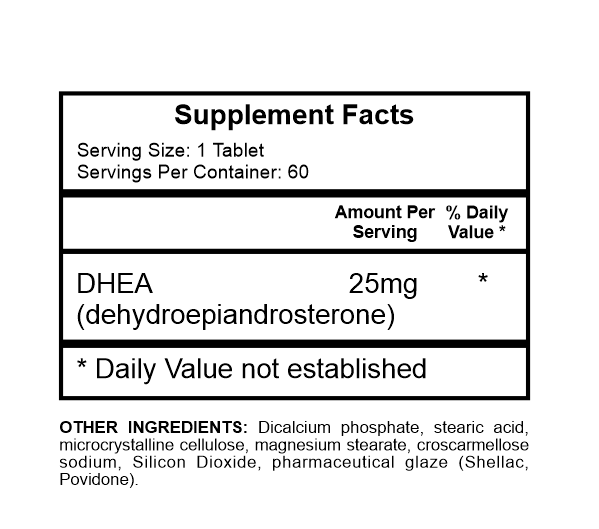DHEA
DHEA
Couldn't load pickup availability
DHEA 25mg
Age Well. Live Fully. Feel Young Again - Naturally.
What This Supports
- Healthy hormonal balance
- Cognitive support and mental clarity
- Healthy aging and vitality
- Bone strength and muscle wellness
- Mood and emotional well-being
- Immune system support
What Is DHEA?
Dehydroepiandrosterone, or DHEA, is a hormone produced naturally by the adrenal glands and often referred to as the mother hormone because it can be converted into important hormones such as estrogen and testosterone. Natural levels peak around age 25 and decline steadily with age, which is why supplementation is often used to support healthy aging.
DHEA plays a role in hormone balance, immune function, mood, energy, and cognitive health. This makes it a key component of overall vitality as the body matures.
Why It Works
Because DHEA declines naturally with age, supplementation may help restore balance and support hormones that influence mood, energy, metabolism, libido, and overall well-being. Its role as a precursor hormone allows the body to convert it into what it needs most, supporting healthier aging from multiple angles.
Emerging research also suggests potential benefits for bone density, immune resilience, cognitive performance, and emotional wellness.
Key Benefits of DHEA
Hormonal Balance
As natural DHEA levels decline with age, supplementation may help support hormonal equilibrium and reduce some effects of aging linked to lower hormone production.
Sexual Wellness
May support libido and healthy sexual function in both men and women due to its role in estrogen and testosterone pathways.
Mood and Mental Health
May help improve mood, reduce anxiety, and support emotional well-being through neurosteroid activity.
Bone and Muscle Support
Research shows potential benefits for strengthening bone density and supporting muscle mass, especially in aging adults.
Cognitive Health
May support memory, focus, and long-term cognitive wellness as part of healthy aging.
Immune Function
Early studies suggest DHEA may help support immune activity, although more research is needed.
Supplement Facts
Serving Size: 1 Tablet
Servings Per Container: 60
| Amount Per Serving | % Daily Value |
|---|---|
| DHEA (dehydroepiandrosterone) 25mg | * |
*Daily Value not established
Other Ingredients:
Dicalcium phosphate, stearic acid, microcrystalline cellulose, magnesium stearate, croscarmellose sodium, silicon dioxide, pharmaceutical glaze (Shellac, Povidone).
Additional Benefits
Healthy Aging: Supports vitality, resilience, and balanced hormonal pathways.
Premium Quality: Produced with high-purity ingredients to ensure consistency and effectiveness.
Simple Daily Routine: One tablet per day supports long-term wellness goals.
How to Use
Take 1 tablet daily or as directed by your healthcare provider. Not recommended for individuals under 18. Consult your physician if pregnant, nursing, or taking medication.
NOT AVAILABLE FOR INTERNATIONAL PURCHASE
*This statement has not been evaluated by the Food and Drug Administration. This product is not intended to diagnose, treat, cure, or prevent any disease.
Why People Trust Young Again
- Honest pricing
- Straightforward formulas
- Backed by 30 plus years of results
- Created for aging without fear
Share





